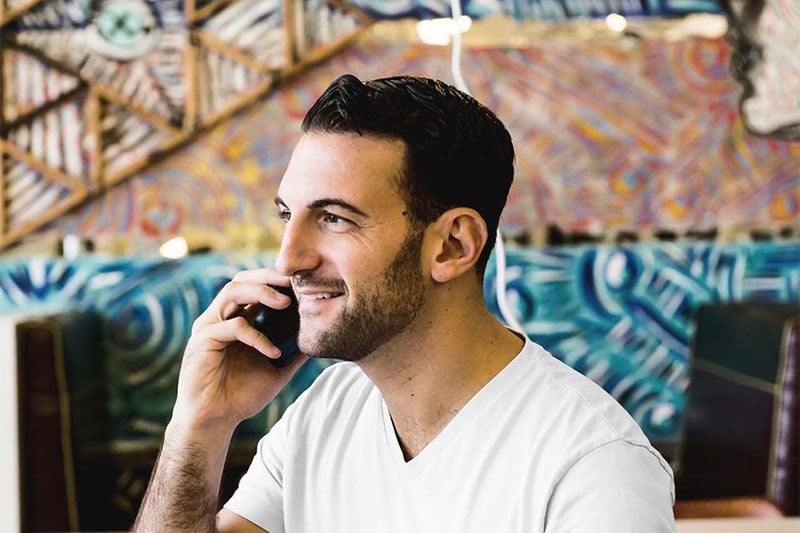Award-winning business strategist Athan Slotkin, AKA The Shadow CEO, discloses his top survival tips for building a successful business in volatile times.
In the wake of widespread closures and a slumping economy, the prospect of starting a business during COVID-19 is unthinkable for many. But for Athan Slotkin, the lead behind elite small-business consulting firm The Shadow CEO, now could not be a more opportune time. “Some of the biggest companies today were actually born out of the recession and dot-com burst,” he stated in a recent TV interview. “It’s a really unique time for entrepreneurs, and anyone interested in starting a business, because rarely is there such a big shock that turns consumer needs and preferences on its head.”
Athan is one of the brightest strategic thinkers in America today and a successful multi-time founder in his own right. Also a former professional poker player (his winnings paid for his Yale MBA), he is an expert at making “unemotionally good decisions” and has counselled over 730 entrepreneurs across 76 countries and 43 industries to date. We sat down with Athan recently to glean the secrets of his trade, and the seven key things every entrepreneur should do to survive – and thrive – in the coronavirus economy.

Analyse your ‘burn rate’ and go lean
“Your job as an entrepreneur is not to predict the next COVID-19. Your job is to predict the fact that things will go wrong.”
During a crisis, entrepreneurs need to be hyper-conservative with their projections. “Living month to month, which is the unfortunate reality for a lot of companies right now, is no way to live your business life,” Athan remarks. “Your job as an entrepreneur is not to predict the next COVID-19. Your job is to predict the fact that things will go wrong, so that when they do, you still have enough ‘runway’ to be able to withstand it for another 12-18 months – even with no revenue.”
Start by looking at where your business is spending in a given month, and determining your fixed expenses – i.e. your non-negotiables. Then, consider any costs that may be reducible without sacrificing the overall standard, such as rent, excess marketing, or company size. Think as lean as possible – the goal is to fully convince yourself that your business is viable in even the worst, bare-bones scenarios.
While ‘trimming the fat’ of a business you’ve put your blood, sweat, and tears into is undoubtedly hard, Athan urges entrepreneurs to “take the same unemotional lens you would if you hadn’t had the business already and ask yourself, ‘with the resources I have today, is this a good business right now?’” Whether your business was successful yesterday or a month ago doesn’t matter. What matters is you make the best rational decision about where to allocate your resources and attention at this point in time.

Know where you sit on the value chain
In order to make those rational decisions, it’s crucial to acknowledge where you sit on the value chain. Referencing the ‘Warren Buffett Way’ of only investing in what he knows will be relevant into eternity, Athan poses the ultimate litmus test to entrepreneurs: “Are you delivering a staple good that is absolutely needed, and are there substitute goods out there that could render it obsolete or semi-obsolete in the event of a big shock?”
Athan uses two examples – travel and restaurants – to illustrate his point. “For the most part, you can only fly if you want to see Europe or Africa, so travel doesn’t have a lot of substitute goods that exist. But despite this fact, what we’re seeing today is that travel is not a bare necessity – it doesn’t fall within Maslow’s hierarchy of needs like food, sanitation, or security does.” Food is therefore a shock-proof item to build a business around because people will always spend money on it. However, this doesn’t always mean that the service providers of food (e.g. restaurants) are as shock-proof as the raw products themselves. “It’s a question of what form factor is taken,” Athan explains. “Even if it weren’t for COVID-19, restaurants will still encounter problems because people can trade down from this higher-price, service-added element of the value chain by cooking at home.”
Embrace flexibility – both in operations and mindset
“The real lesson here is making peace with the fact that your business could very well be a fleeting, time-compressed opportunity.”
With so little foresight into what next week will look like, let alone 12 or 18 months down the line, your safest bet is to adopt a business model that allows for maximum pivot potential. “Increasingly, we’re seeing a new breed of entrepreneurs opt for more flexible, less fixed overhead, less liability-based business models, where they don’t necessarily have contracts they have to stay in for 12 months”, Athan observes. “It’s exactly why the coworking space and services parallel to it are so popular now – their very premise is entrepreneurial flexibility.”
One way to embrace flexibility in operations is by diversifying your revenue stream. On the closure of brick and mortar businesses worldwide, Athan says, “If any given business (whether that’s a startup or corporation – had had an e-commerce component for serving up their products, as well as the marketing campaigns and CRM to capitalise on it, they wouldn’t be scrambling right now. A diversified revenue stream not only means more revenue, but also more ways of reaching more customers with fundamentally different needs as a result of this crisis.”
Mindset is equally important here. While it can be tempting to rush after ‘trendy’ products like masks or hand sanitiser, “far larger, far better capitalised businesses are probably going to solve that puzzle faster than any individual can,” Athan warns. At the same time, being ‘relevant’ and ‘future-proof’ doesn’t have to be either-or if you design with a mindset of likely adjustments coming. “I think the real lesson here is making peace with the fact that your business could very well be a fleeting, time-compressed opportunity and shut down. It kind of depends on how you define your ‘business’ – as an entrepreneur, it’s about continuing to evolve, make money, and succeed in any way, shape, or form possible.”

Raise capital on a nice-to-have basis, not a must-have one
In light of global investor weariness and concerns about stabilising existing portfolio companies, how should one go about raising capital? For Athan, the answer lies in being cognisant of the circumstances, honing in on what you can control, and working according to pragmatic timelines. “Never, ever, as an entrepreneur, do you want to operate from a place of so little leverage where you’re desperate for money. This takes away your ability to work along slightly elongated timelines and develop relationships so that when the storm does clear, you’ll be at the front of investors’ minds.” (Read Athan’s blog post here to learn more about determining exactly how much capital to raise)
On the off-chance that you do find yourself in a position of desperation, however, Athan advises entrepreneurs to buckle down, get their hands dirty, and “do whatever it is you need to do to keep your business humming.” This might entail revising salaries, going freelance for a while, providing online consulting services or, in Airbnb’s case, selling Obama-labelled cereal boxes. “You’ll have a ‘war story’ to tell on the back of it, which might make you that much more of an interesting investment as well!”
Be astutely aware of direct and indirect competition
Success in entrepreneurship, especially during a pandemic, is almost never an accident. Rather, it’s the result of careful positioning and a keen grasp of the ‘micro’ and ‘macro’ context of your industry. Start by studying those businesses that are thriving in the face of crisis, and learning what they’re doing differently. “Securing competitive advantage is like table stakes, I would say, and most entrepreneurs are already doing this. But where I see a lot of them fall short is not monitoring indirect competition,” Athan reveals. “So that means looking at companies that solve the same problems, even if they look completely different to yours.” From there, it’s about identifying the needs or pain points that exist (and may persist) for your target customer base, and solving for them with laser-like focus.
Again, ensuring the sustainability of your position is key if you want to avoid getting pushed out of the market later on. “Competitive differentiation is great, but sustainable competitive differentiation is way better because it means none of your competitors, direct or indirect, can loop back afterwards, copy your idea, and put you back on your heels, especially if they’re better funded.” In doing so, your business becomes significantly more attractive to investors and partners.

…But don’t rule out collaboration either
Getting a business off the ground, much less achieving any semblance of competitive advantage, is gruelling work. It’s important to recognise that you can’t be great at everything and “there’s absolutely nothing wrong with reaching out for short-term help,” says Athan. “I’ve been in my clients’ shoes several times before and it’s tricky being the only one who sees your vision.” In many cases, nurturing your connections can open more doors than stoically going it alone.
However, Athan admits that opting for collaboration over competition doesn’t come naturally to most entrepreneurs. “It’s hard for anybody, especially those with the entrepreneurial mindset, to think that way sometimes because you’re so wired to beat out the competition. But I would argue that, even in the current state, you can envision how players within an industry would want to cluster together for the sake of ‘growing the pie’. It just comes down to: would you rather have 50% (or less) of a big pie, or 100% of a small one?
Think of COVID-19 as just another shock
“That’s all this is – a new canvas. And with a new canvas comes the opportunity to create art.”
Fundamentally, entrepreneurship is an exercise in pivoting and reacting to roadblocks; and COVID-19 is no different. So try to approach it with the same rationality and tenacity like you would any other roadblock.
“COVID-19 is just the latest of shocks. It feels a little uncomfortable now because it’s bigger than average, but entrepreneurs are entrepreneurs for that reason. Our lives are a constant pivot. It’s not a short, discrete thing but an ongoing series of bigger and smaller lessons. Many people are just sitting on their hands because they don’t know what to do, so an arbitrage opportunity exists here for entrepreneurs, especially new ones, to be able to think, strategise, and attack this new canvas. That’s all it is – a new canvas. And with a new canvas comes the opportunity to create art.”
Looking to take your business strategy to the next level? Visit The Shadow CEO website or follow Athan’s Instagram for more useful resources – including a free ‘Optimal Business Strategy’ blueprint, weekly CEO5in5 newsletter, and custom consulting services.
Related Articles
7 Business Tips You Should Learn from COVID-19
5 Small Business Marketing Tips to Implement During COVID-19
COVID-19 Cyber Security: How Firms Can Better Protect Their Data





